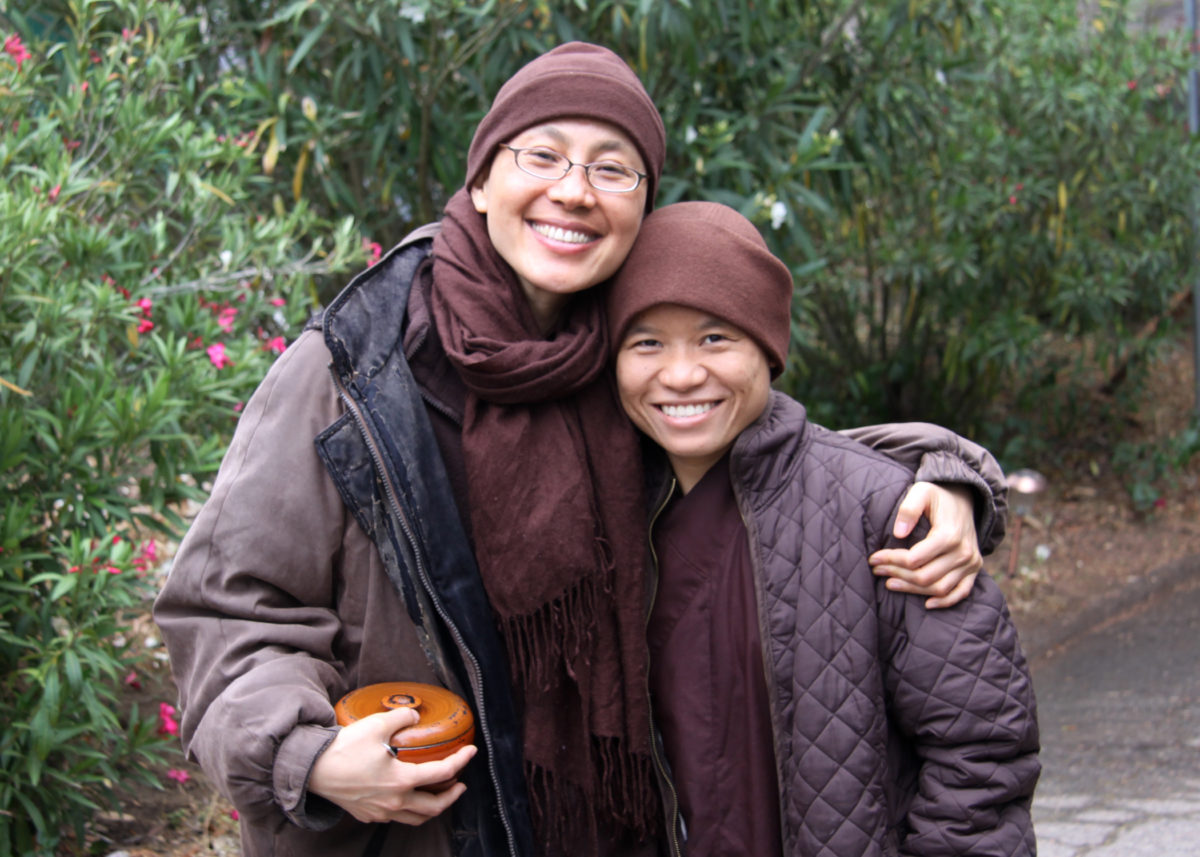By Lennis Lyon

The last sentence in the Eighth Mindfulness Training encourages us to “be active in finding ways to reconcile and resolve all conflicts however small.” The words “however small” have challenged me for years. If I have discomfort in my body following a communication, I do my best to restore the ease between myself and the person I perceive to be the cause or the object of my discomfort.
By Lennis Lyon

The last sentence in the Eighth Mindfulness Training encourages us to “be active in finding ways to reconcile and resolve all conflicts however small.” The words “however small” have challenged me for years. If I have discomfort in my body following a communication, I do my best to restore the ease between myself and the person I perceive to be the cause or the object of my discomfort. If I do not tend carefully to this disruption, I will communicate my hurt, anger, embarrassment, regret, or shame by such actions as avoidance of contact, lack of affection, and less tenderness in my voice.
I use Beginning Anew as a letter-writing practice to restore communication. I wish to allow time to breathe, to look for the roots of my anger or hurt, and to see the seeds of suffering in the other person. Writing allows time for me to compose my message and for the recipient to have spaciousness to respond. I’ll share the Beginning Anew guidelines and examples of expressing beneficial regret and hurt.
To Express Beneficial Regret
First Step: Flower watering: Say something true that is nourishing to the recipient. Second Step: Express beneficial regret for your action or inaction. Third Step: State your intention to prevent similar actions.
EXAMPLE OF BENEFICIAL REGRET
At a meditation retreat, I gave someone a hug and felt a sudden sharp stiffening. I regretted I didn’t ask her permission.
“Dear ________________,
I appreciated the deep relaxation you offered. I found ease and light in new places in my body. I came to sit next to you on the couch to thank you, but I wasn’t sure how to do this because we were in silence. I gave you a kind of unexpected and awkward hug. I regret if my actions caused you any discomfort or watered any negative seeds. I know it is our practice to ask before offering a hug. I will do my best to follow this practice in the future. I appreciate your gentle smile. Lennis”
I received this note in response:
“Dear Lennis,
Thank you for your sweet note. I felt no offence whatsoever at your actions. I appreciate your sweet nature. Also, thank you for lending me the book. I love the postcard as well. I love Yosemite and all the amazing nature places.
Love,
Person’s name
P.S. I like how you cry often. I feel too closed up to cry a lot of the time.”
To Express Difficult Emotions Without Blaming
Step one: Flower watering. Step two: Express your feelings by owning them. Step three: Share your intention to understand the roots of your difficult feelings, such as hurt or anger, or share what you have learned by looking deeply.
EXAMPLE OF SHARING DIFFICULT EMOTIONS
I provided childcare for two children, ages two and five. When my relative picked them up, I felt hurt by something she said.
“Dear ______________________,
I had sweet feelings yesterday when I saw again how deeply affectionate you are with your children and the ease with which they lap up this tenderness. I am also writing to let you know about something that happened yesterday because I value our connection and want to support it. When I took the Mindfulness Trainings, I agreed to “make all efforts to reconcile all conflicts, however small.”
As you were leaving yesterday, when you said, “We should have left a long time ago,” I felt hurt and a little bit frightened by the words and your tone. I am looking into my experiences to understand these feelings from my past. I think there is sadness also. With love, Lennis”
I received this response within two hours:
“Lennis, I am sorry that my words hurt you. I in no way meant that there was something you did. I have a difficult time dealing with the tension that arises for (my child) at times of transition and feel guilty about it. I also feel guilty for the extra time I spend to have tea with you and not taking care of the kids’ needs, i.e. dinner, home at a decent time for bed, etc. I have felt so disconnected from people as I embark on this new job and have lingered at your house often with major outbursts from (my child) toward the end. His aggression toward his sibling, without intending to be aggressive, is difficult for me to handle. Stating that we should have left earlier was my outward way of expressing that. Again, I’m sorry if saying that was hurtful. If you have any thoughts on helping (my child) manage transitions I would be open to it.”
I replied:
“Dear________________________,
Thank you for responding with kindness so quickly to my note. I appreciate being deeply heard by you, and I felt better right away. I’m also grateful for your openness in helping me to understand your experience—of feeling torn between wanting to connect with friends and adults in our family and meeting the responsibilities of caring for two young children. Having to handle outbursts from [your child], especially toward his sibling at the end of a long day, is truly difficult and exhausting. When I think of all you may be handling, I see pressures from many directions. I also see you are doing much to benefit your family and you care deeply for the welfare of all. I see how hard you have been working with a full-time job, preparing for the exam, and finishing school.
Thank you for inquiring about my thoughts regarding helping [your child] manage transitions. I welcome a conversation about this, as I also deal with these issues. Between us we may have some insights and helpful ideas. I used to think I needed to solve things by myself. Lately, due to working with my Sangha buddies on projects, I am opening more to the mingling of ideas. With best wishes, Lennis.”
I have practiced such letter writing for more than twenty years and in many situations with my grandsons, my partner, a school principal whom I interrupted, the head waiter at a meditation retreat, someone I forgot to notify for a meeting, a close Sangha friend I gave incorrect information to for a presentation, and a dear friend whom I thought publicly embarrassed me for not being “Buddhist” enough. The practice has allowed friendships to bloom and renewed my sense of wellbeing.
For a deeper understanding, please see Sister Chan Khong’s book, Beginning Anew: Four Steps to Restoring Communication, published by Parallax Press.

Lennis Lyon, True Silent Forest, was ordained as a Dharma Teacher by Thich Nhat Hanh in 2014. She practices with the Potluck Sangha and the White Awareness Support Group in Oakland, California, US.

